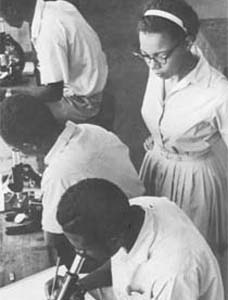
Morocco RPCV Thomas Dichter says: What Poor Countries Need Is Less -- but Smarter -- Aid
What Poor Countries Need Is Less -- but Smarter -- Aid
# The trillions we've invested haven't really done much.
COMMENTARY
By Thomas Dichter, Thomas Dichter has worked as a Peace Corps volunteer and country director, and as a consultant to USAID, the World Bank, the Ford Foundation and others. He is the author of "Despite Good Intentions: W
On Jan. 17, the United Nations issued a massive report calling for at least a doubling of aid to the developing countries by 2015 in an effort to drastically reduce poverty.
But giving twice as much money is actually a bad idea. The trillions we've invested in the last half-century haven't accomplished much, and more money will not make the aid industry work any better in the future.
Over a 40-year career, I've worked in practically every type of aid organization, and I've seen up close what gets spent and what gets accomplished. So I have a modest counterproposal: Cut aid by half, send most of the "experts" home, close or shrink most of the organizations in the aid business, and start over.
This time, instead of planning and funding what we think the Third World needs and what fuels the aid industry itself, we should base our efforts on what the Third World tells us it wants and what it can sustain.
The U.N. report calls for, among many interventions, more investment in primary education, gender equality programs and programs to slash preventable deaths among children and mothers. It singles out the need for "quick wins": for example, mass distribution of insecticide-impregnated bed nets to prevent malaria.
This push would increase aid to an annual world total of $195 billion per year in 2015, and officials predict that with it poverty would be cut by half by 2015 and eliminated altogether by 2025.
But we did a big push in the 1950s and '60s, when the U.N. declared "Freedom From Hunger" as a major theme and established "the Decade of Development." Close to $2 trillion has been spent over the last 60 years on such familiar problems as malaria, illiteracy, women's rights, primary education, soil improvement and legal reform.
We distributed billions of shovels and seeds, computers and condoms and, yes, even insecticide-impregnated bed nets. But not once has there been a "quick win," not to mention any serious reduction in world poverty (or at least any that can be attributed to our work).
Why then spend more money now? Why accept proposals we have heard and tried before? Has something changed? Have we learned something new?
The argument for more aid has several prongs.
First, the U.N. would have us believe that developing countries have a greater willingness now to deal with corruption and a greater capacity for economic growth. In 1998, the World Bank did a study that showed that a 1% increase in aid to countries with "good" policies (those with effective property rights laws and land titling, functioning banks, little inflation) correlated with a 0.5 % increase in annual growth and a 1% reduction in poverty. But historical evidence suggests that such countries will grow their economies and reduce their poverty even without the aid. In short, once a country gets its act together, it doesn't really need much aid. And when it's in chaos, it cannot make effective use of aid anyway. Either way, more money won't help.
A second argument for a big new aid push says a better grasp of the complexity of the challenge has finally taught us how to create a comprehensive approach that can move countries from the undeveloped category to the developed. But aid agencies since the 1950s have thought that they had that formula, only to find that conquering problems in undeveloped countries is like squeezing a balloon — push it in here and a bulge pops out there.
History should teach us that it took advanced industrial nations hundreds of years to "develop," and even though we now live in a faster world, it is not reasonable to expect the aid business to finish the job in the Third World by 2025 with any amount of money.
History also should show us why the aid bureaucracy cannot work miracles. What we do is supply-driven. Development agencies often go to the recipient countries and suggest possible projects. But because development is so complex and cannot be easily parsed into "projects," we end up making damaging compromises. We put money into projects before they're ready, make partners out of those with little management capacity and create dependency when we wanted self-reliance.
There used to be a saying among Africans who dealt with aid experts: "The white man has a big watch, but never any time." The aid industry always wants to act and to spend — now. A $100-million Phase II project is often approved before the results of Phase I are in. Lessons learned are rarely absorbed or applied. Mistakes are repeated. I worked on a project to improve chicken production in North Africa in 1965 that failed. In 2004, almost the same project failed again, this time in Mauritania.
We are in a hurry because we need to get the money spent; otherwise we cannot ask for more the next time. And of course the hundreds of thousands of us who work in this business need to keep our jobs.
Instead of another big push, we need to stop the action and think. How many aid agencies, workers and programs are really needed? How much bureaucracy and staff can be productively cut? What would happen if we made aid contingent on recipient countries' meeting mutually agreed upon specific goals?
Unfortunately, the call to double the money available to help the needy — and prop up the aid business — isn't likely to spur reform. It just means more money will be paid, and not enough will be accomplished. And come 2015, more calls for more money will surely arise.











